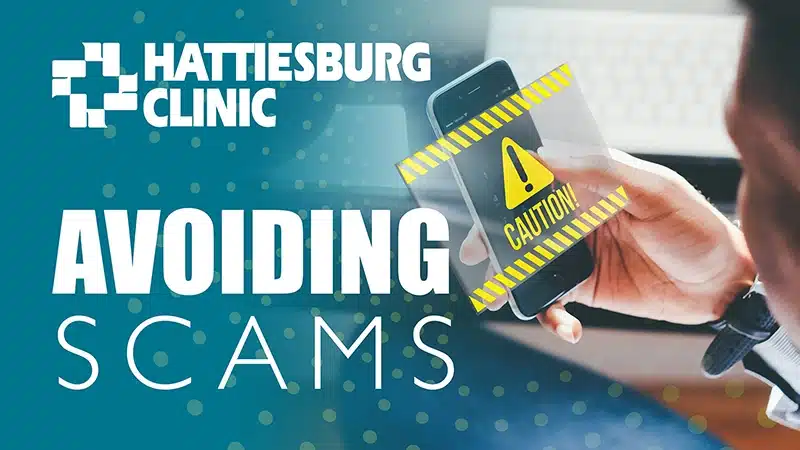Protecting Yourself from Health Care Scams
“Is that email really from my doctor’s office? Is that text message really from Medicare? Is this phone call really from my insurance company?” These are the types of questions that many of us find ourselves asking more and more often. Your protected health information (PHI) is valuable, and when it falls into the wrong hands, it can be used to file false insurance claims or obtain medical services under your name – leaving you with a stolen identity and significant financial harm.
Hattiesburg Clinic will never contact you and request information about your insurance or any other personal information. But with bad actors becoming more sophisticated and more creative, they can make their messages, calls or emails appear legitimate. They often use urgency and fear tactics to trick people into providing personal information. Even the most tech-savvy, informed people can sometimes be fooled by these high-pressure, complex and deceptive schemes. The best way to protect yourself from health care scams is by staying informed and vigilant. In this article we will explore common ways scammers contact patients, various types of health care scams, identifying and avoiding scams, and what to do if you suspect you are being targeted.
Common Methods of Contact
Scammers use various methods to reach potential victims, including:
- Phone Calls: They may call pretending to be from a legitimate organization like Medicare or a health care provider
- Emails: Scammers send emails that look official, often mimicking the logos and language of real health care organizations
- Text Messages: These messages might ask you to click a link or call a number to verify personal information
- Social Media: Scammers can also contact you through social media platforms, posing as trusted sources.
Types of Health Care Scams
There are various types of scams to be aware of, each with different tactics:
- Phishing: This involves scammers sending emails that appear to be from legitimate organizations, asking you to click a link and enter personal information.
- Spoofing: Scammers disguise their phone numbers or email addresses to appear as if they are from a trusted source. They might use a caller ID that shows the name of a real health care provider.
- Spearphishing: This is a more targeted form of phishing where scammers use personal information about you to make their scam seem more credible. They might mention your doctor’s name or specific health conditions.
- Smishing: Similar to phishing, but it uses text messages instead of emails. The message might include a link or a phone number to call for more information.
Awareness and Identification of Scams
Being aware of scams is the first step in protecting yourself. Here are common signs to help identify a scam:
- Unexpected requests for personal information.
- Communications that pressure you to act immediately.
- Poor grammar or spelling mistakes in emails or texts.
- Unfamiliar or suspicious-looking email addresses or phone numbers.
- Offers that seem too good to be true, such as free medical equipment or services.
How to Avoid Health Care Scams
To safeguard your PHI, follow these tips:
- Do Not Share Personal Information: Never give out your health information, Social Security number or insurance details unless you are sure of the recipient’s legitimacy.
- Verify the Source: If you receive a call or message, contact the organization directly using a verified phone number to confirm its authenticity.
- Stay Skeptical: Trust your instincts. If something feels off, it probably is.
- Use Security Software: Protect your devices with up-to-date antivirus software and be cautious about the links you click and the information you share online.
What to Do If You Suspect a Scam
If you suspect you have been targeted by a scammer:
- Do Not Respond: Ignore the message or hang up the phone.
- Report It: Contact your health care provider, insurance company or the authorities to report the incident.
- Monitor Your Accounts: Keep an eye on your health and bank accounts for any unusual activity.
- Change Passwords: If you’ve shared any information, update your passwords immediately.
- Report the scam by visiting www.usa.gov/identity-theft.
Staying informed and vigilant is the best way to protect yourself from health care scams. By recognizing the signs and knowing how to respond, you can keep your protected health information safe.
You can find more information and examples of some common health care scams here:
https://www.fcc.gov/older-americans-and-medicare-scams
https://consumer.ftc.gov/articles/how-recognize-and-avoid-phishing-scams
https://oig.hhs.gov/documents/root/235/OIG_Med_Id_Theft_Brochure.pdf
https://www.fcc.gov/scam-glossary
###
About Hattiesburg Clinic:
Hattiesburg Clinic is Mississippi’s largest privately-owned, multispecialty clinic. More than 60 years after its beginning, the clinic has grown to over 450 physicians and providers, caring for patients in more than 17 counties in South Mississippi. Along with over 2,500 professional staff employees, these physicians and providers come together for a common purpose, to serve the over 500,000 community members who live and work in South Mississippi every day.
